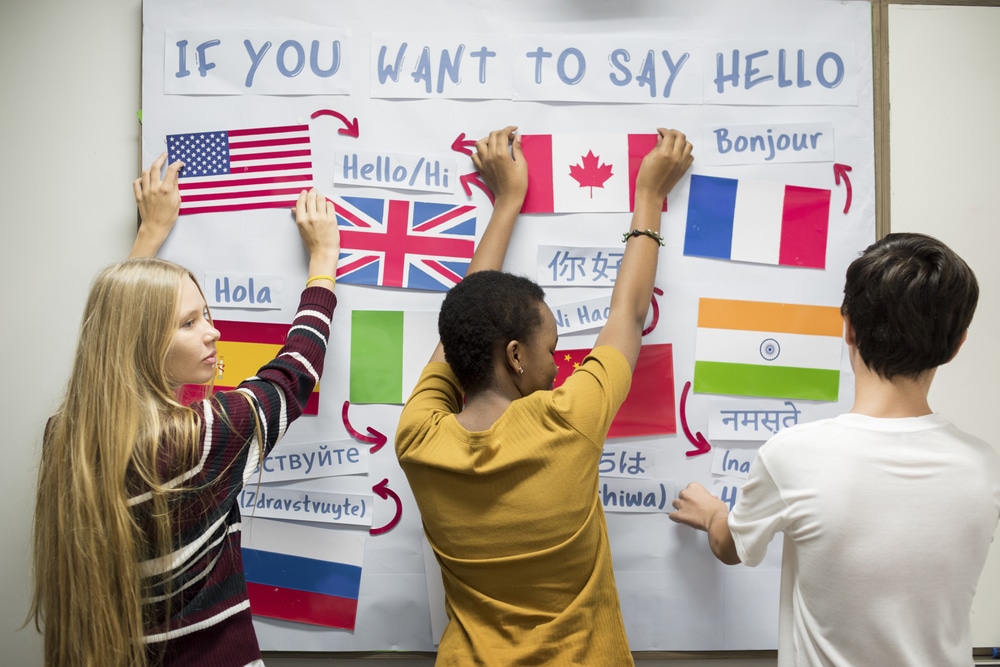
12 Benefits of Learning a Foreign Language
In today’s hyper-connected, fast-paced world, there are many reasons to learn another language.
Perhaps you’re one of the lucky ones who grew up speaking two languages as a native bilingual. If so, you have some unique advantages compared to the rest of us.
However, if you’re looking to become bilingual, you’ve got good things going for you too.
Below are 12 awesome side effects of becoming bilingual—or multilingual!
Contents
- Why Learn a Second Language?
- 1. You can talk with more people.
- 2. It’s a major advantage in the workforce.
- 3. Traveling is easier and more fulfilling.
- 4. You gain cultural knowledge and perspective.
- 5. You have access to more information and entertainment.
- 6. It improves your communication skills.
- 7. It makes other languages easier too.
- 8. You can help more people.
- 9. It improves a ton of cognitive functions.
- 10. It delays the effects of aging.
- 11. It boosts your creativity.
- 12. Your self-confidence will soar.
- Which Language Should I Learn?
- How Do I Get Started?
Download: This blog post is available as a convenient and portable PDF that you can take anywhere. Click here to get a copy. (Download)
Why Learn a Second Language?
1. You can talk with more people.

What’s the fastest way to make 1.2 billion friends?
But seriously—learning another language gives you uncountable opportunities to meet and connect with others due to the simple fact that you can talk to more people.
Of course, learning another language allows you to meet people who already speak that language, too. For one, you can connect with fellow language learners. Another way is to find a language exchange partner.
Or chat with your taxi driver. Make small talk with the store clerk. Get to know the man who sits next to you on a long bus ride.
These people might have the potential to become your new business partner, best friend or soul mate. That’s pretty thrilling!
You don’t even need to be fluent to get started.
When I traveled around Myanmar, I spent a couple weeks in a city called Yangon. I only knew the basics of the Burmese language, but I was determined to practice those few phrases at every opportunity.
One street vendor was so taken with my efforts that he spent 30 minutes trying to communicate with me about his family, work and life philosophy. Not only did I leave that conversation with new language skills, but also with a free bag of food and a hug!
But the conversations are just the beginning.
Communicating in someone’s native language also shows respect, and it allows you to connect on a deeper level. You might be surprised how open people are when you speak their mother tongue.
2. It’s a major advantage in the workforce.

Adding a second (or third, or fourth) language to your CV gives you an unparalleled advantage in today’s global economy.
More and more employers are looking for people who speak multiple languages. This is especially true for fields like customer service, hospitality, health care, information technology and administrative work.
Multilingual people can communicate and interact with diverse communities. This is a valuable asset in an employee’s skill set.
You definitely up your professional value if you can negotiate with manufacturers in another country or communicate with customers who don’t speak your native language.
Plus, fluency in a foreign language opens up opportunities abroad which simply are not available to monolingual job hunters.
Your ability to speak another language also conveys that you’re motivated and driven to learn new skills.
It’s possible that you could be compensated for maintaining your language skills through foreign proficiency bonus pay, too—take the US military for example.
Which language is best? Try learning Spanish, Arabic or Mandarin Chinese to give yourself an edge!
3. Traveling is easier and more fulfilling.

Traveling—whether for business, vacation or visiting family or friends—is much easier if you speak the language of your destination:
- Restaurants. Most non-speaking travelers resort to the “point and hope” method of ordering food. But when you know the local language, you can order specific foods you know you like or want to try.
- Transportation. If you’re in a big city, you might hear some English translations. But the farther away you get from the capital, the less likely you are to hear any familiar words. Where you are, where you’re going and how you get there is all going to be communicated in the country’s native language.
- Signs. If every sign you see is just random squiggles, there are bound to be problems. Where’s the bathroom? Which way is the subway? What’s the name of this road? Which side of the road should I be driving on? Signs are everywhere, and they’re often important.
- Avoid miscommunication. Most visitors who don’t speak the language struggle to communicate even the simplest things to locals. Suddenly, trying to buy a shirt or deposit money at the bank becomes lost in translation.
4. You gain cultural knowledge and perspective.
Language helps you understand the world.
Learning another language isn’t just about words and grammar. Knowledge of the society and culture behind that language is necessary to achieve any degree of fluency. The history and culture of a people are reflected in the language, and vice versa.
It’s important to remember that languages aren’t simply different sets of words to express the same ideas—they’re entirely different outlooks on the world.
Linguistic relativity is the concept that language dramatically shapes the way we think about, perceive and interact with the world around us. Most people who speak multiple languages will tell you there’s a profound spiritual and emotional element to it.
Allow this to open you up to the world, broaden your horizons and bring you closer to people of all races and nationalities.
You may develop a deep appreciation for another culture, fall in love with a native speaker or become unlikely friends with someone totally different from you.
5. You have access to more information and entertainment.

Perhaps the most fun perk to learning another language is consuming native media.
You’ll have access to a whole new selection of music, movies, TV shows, books, news programs, podcasts, websites and more.
Of course, it takes time and effort to reach a level where this is comfortable. But there’s plenty of multilingual content to get you started!
For example, people who speak Spanish and English can understand every word of the songs of Enrique Iglesias, Shakira, Pitbull and other internationally-successful Latin pop stars.
Japanese and English speakers hold claim to some mind-blowing “Kill Bill” scenes and the cultural miscommunication in “Lost in Translation.”
It may take a while, but try not to get frustrated on your path to understanding—consistency is key.
One day you’ll be reading or listening to something in your target language and suddenly realize that you understood it with no extra effort at all.
6. It improves your communication skills.
Of course, learning a second language improves your listening and speaking skills.
You’ll learn to listen more effectively and to be as clear as possible when you’re talking. The ability to clarify intended meanings will benefit you in any situation and any tongue.
You’ll likely gain reading and writing skills as well. You’ll think more carefully about the words you use and the meaning you’re expressing in your non-native language.
In fact, your acquired language literally helps you think more logically, process information and speak more evenly.
Learning another language will also make you more adept at piecing together information and interpreting context, whether it’s an unclear situation or cross-cultural communication.
The ability to look at things from various angles and understand someone else’s perspective means you’ll be able to communicate more respectfully and more effectively in any language.
7. It makes other languages easier too.

Learning your first language happens naturally through observation, so many people don’t explicitly know the underlying rules or logic of it.
To learn a second language, though, you pretty much have to learn the rules.
Many people who learn another language discover that they also gain unanticipated benefits in their first language, like becoming more conscious of and knowledgeable about their native grammar, vocabulary and pronunciation.
If you learn another Indo-European language (such as French) as a native English speaker, you’ll likely discover significant amounts of borrowed vocabulary, which will help you better understand how English became English.
What’s more, the acquisition techniques you use to learn your second language can be applied to subsequent languages too.
Learning a language trains your brain to analyze and process various linguistic structures. Your brain learns to identify language-learning techniques and break them into steps—and will do the same with other foreign languages!
So, studying your second language increases your ability to replicate this “metalinguistic awareness” process later. Your brain’s increased knowledge of syntax, grammar and sentence structure will give you a head start on learning your third language.
8. You can help more people.
Studying a foreign language doesn’t have to be all about you!
Perhaps it’s obvious, but speaking another language allows you to help more people.
For example, if you’re a certified teacher with multilingual abilities, consider using your unique language skills to teach others. You could help out refugees in your home country, tutor students while living abroad or simply teach your friends and family the language(s) you speak.
If you can’t or don’t want to teach, there’s volunteer programs around the world where multilingual speakers are a particularly valuable asset to the team. Medical assistance programs, educational consultancies and cultural events are good places to find volunteer opportunities.
Being the bridge of communication between cultures is a great feeling, and the joy you’ll get from helping someone in need will make all the hard work of learning the language worth it.
9. It improves a ton of cognitive functions.
Learning another language makes you smarter—and not just because you’ll know more words and grammar structures.
Acquiring a second language improves memory, increases attention span and strengthens problem-solving abilities.
Check out this video by the British Broadcasting Corporation that breaks down the advantages of learning new languages.
In fact, studies have shown that multilingual people:
- are more logical
- use more of their brains
- have better working memories
- can switch between tasks more quickly
- have greater self-control
- are more focused
- make better financial decisions
All of these executive function benefits are likely the result of the bilingual brain’s constant need to choose the correct language and words to speak at any given moment, as well as its ability to detect which language it’s hearing.
Of course, the younger you are when you begin learning a second language, the easier it will be and the quicker you’ll see the effects. And for children especially, learning another language can help build social, cognitive and emotional intelligence, as well as lead to higher standardized test scores.
Learning a foreign language may also teach children to be more culturally accepting—just as it helps adults broaden their perspective and cultural knowledge.
Further, not only do these advantages make it easier to learn more languages, as mentioned above, they make it easier to learn anything.
It’s thought that all this is because learning languages helps your brain exercise, sort of like how bodybuilders grow and tone their muscles. And who wouldn’t love to be strong?
10. It delays the effects of aging.
If picking up a language as an adult looks good, doing it as a senior is even more impressive!
Having multiple languages under your belt as you age can also have major advantages.
In particular, research has shown that knowing more than one language can potentially reduce the risk of dementia and delay Alzheimer’s Disease.
Regardless of education level, gender or occupation, multilingual subjects in this study experienced the onset of Alzheimer’s about four and a half years later than monolingual subjects.
Study results also show that speaking more than one language increases the amount of neural pathways in the brain.
This allows information to be processed through a greater variety of channels and can keep your brain sharp as you age.
11. It boosts your creativity.

Anyone learning a language has experienced moments of serious linguistic problem solving.
You know what you want to say, but not in the language you’re currently speaking. You can’t move forward without the word, so you have to get creative.
Using your second language requires you to learn how to give clues, context, explanations and/or gestures to get your point across. It improves your skills in divergent thinking—the ability to identify multiple solutions to a single problem.
Because, on top of your limited language and mental roadblocks, you usually need to consider different linguistic and cultural nuances too.
All of this helps you think outside the box.
As a matter of fact, researchers are also concluding that multilingual speakers are more creative than monolingual speakers. This is likely because learning a foreign language gives you leeway to experiment with new words and phrases.
So, every time you stumble over those words and phrases, remember that you’re actually training your brain and developing skills that benefit every aspect of your life.
12. Your self-confidence will soar.
Confidence increases as you learn a new skill—like speaking a foreign language!
Some of this may come from learning something you enjoy, but language instruction also relies heavily on social interaction. Conversations with native speakers are essential to mastering your target language.
At first, speaking can definitely cause some anxiety. But don’t be afraid to let your conversation partners know that you want to practice. It’s a great way to break the ice and start making new friends.
Because English is such a global language, native English speakers who make the effort to learn a foreign tongue are often received with gratitude and curiosity. You might be surprised how many people will want to help you practice!
And remember that practice itself can be a confidence builder.
As you learn and get better at the language, you’ll find that you have increased self-awareness and more confidence wielding your second language… which can also make you more attractive to others!
Truly, people will respect the fact that you’re learning another language. Native speakers will be impressed with your dedication, friends and family will be proud of your motivation and strangers will be interested in your story.
So get learning and build up that confidence!
Which Language Should I Learn?
While there’s advantages for learning any language, some are inevitably more useful than others.
You can check out this post for a more detailed guide to answering this question, but if you’re really not sure where to start, check out the benefits of the languages below to see if any strike your fancy:
- Spanish: As one of the most widely-spoken languages in the world, Spanish comes with plenty of benefits.
- French: Learning French has many pros—like becoming fluent in the language of romance.
- German: If you’re interested in central Europe at all, German is a great way to get familiar with the area and culture.
- Japanese: Learning Japanese is likely an opportunity to discover a completely different culture and way of thinking.
How Do I Get Started?
Gone are the days when the only way to learn a second language was becoming stranded in a foreign country or going back to high school language classes.
These days, there are many ways to learn online to become proficient in the language of your choice.
For example, maybe you plan to study on your own. Set yourself up for success by setting goals, being consistent and making sure you get lots of language input.
Depending on the language you choose, you may need to learn a new alphabet system. You’ll definitely need to learn a lot of vocab.
Just because you have to learn grammar doesn’t mean you can’t have fun though! You can absolutely make your studying as enjoyable as possible—try watching movies, for example!
If you don’t feel ready to watch full-length movies in your target language, don’t worry. Try shorter ones first, like Disney movies dubbed in your preferred language.
You can also prepare with FluentU.
With FluentU, you hear languages in real-world contexts—the way that native speakers actually use them. Just a quick look will give you an idea of the variety of FluentU videos on offer:

FluentU really takes the grunt work out of learning languages, leaving you with nothing but engaging, effective and efficient learning. It’s already hand-picked the best videos for you and organized them by level and topic. All you have to do is choose any video that strikes your fancy to get started!
Each word in the interactive captions comes with a definition, audio, image, example sentences and more.
Access a complete interactive transcript of every video under the Dialogue tab, and easily review words and phrases from the video under Vocab.
You can use FluentU’s unique adaptive quizzes to learn the vocabulary and phrases from the video through fun questions and exercises. Just swipe left or right to see more examples of the word you're studying.

The program even keeps track of what you’re learning and tells you exactly when it’s time for review, giving you a 100% personalized experience.
Start using the FluentU website on your computer or tablet or, better yet, download the FluentU app from the iTunes or Google Play store. Click here to take advantage of our current sale! (Expires at the end of this month.)
Obviously, there’s many benefits of learning a second language. So no matter which tools you use to learn it, you won’t regret doing it!
Download: This blog post is available as a convenient and portable PDF that you can take anywhere. Click here to get a copy. (Download)



